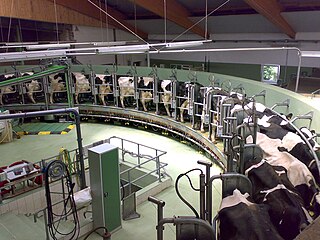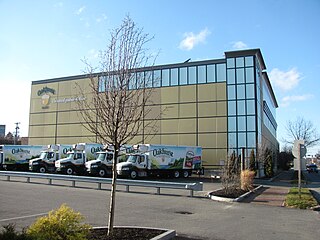
Milk is a white liquid food produced by the mammary glands of mammals and the caecilian Siphonops annulatus. It is the primary source of nutrition for young mammals before they are able to digest solid food. Immune factors and immune-modulating components in milk contribute to milk immunity. Early-lactation milk, which is called colostrum, contains antibodies that strengthen the immune system and thus reduce the risk of many diseases. Milk contains many nutrients, including calcium and protein, but also lactose and saturated fat.

A dairy is a place where milk is stored and where butter, cheese and other dairy products are made, or a place where those products are sold. It may be a room, a building or a larger establishment. In the United States, the word may also describe a dairy farm or the part of a mixed farm dedicated to milk for human consumption, whether from cows, buffaloes, goats, yaks, sheep, horses or camels.

Genetically modified foods, also known as genetically engineered foods, or bioengineered foods are foods produced from organisms that have had changes introduced into their DNA using various methods of genetic engineering. Genetic engineering techniques allow for the introduction of new traits as well as greater control over traits when compared to previous methods, such as selective breeding and mutation breeding.

Dairy farming is a class of agriculture for the long-term production of milk, which is processed for the eventual sale of a dairy product. Dairy farming has a history that goes back to the early Neolithic era, around the seventh millennium BC, in many regions of Europe and Africa. Before the 20th century, milking was done by hand on small farms. Beginning in the early 20th century, milking was done in large scale dairy farms with innovations including rotary parlors, the milking pipeline, and automatic milking systems that were commercially developed in the early 1990s.

Bovine somatotropin or bovine somatotrophin, or bovine growth hormone (BGH), is a peptide hormone produced by cows' pituitary glands. Like other hormones, it is produced in small quantities and is used in regulating metabolic processes. Scientists created a bacterium that produces the hormone somatotropin which is produced by the cow's body after giving birth and increases milk production by around 10 percent.

Raw milk or unpasteurized milk is milk that has not been pasteurized, a process of heating liquid foods to kill pathogens for safe consumption and extending the shelf life.
Jane Akre is an American journalist best known for the whistleblower lawsuit by herself and her former husband, Steve Wilson, against Fox station WTVT in Tampa, Florida. Akre and Wilson are featured in the 2003 documentary film The Corporation which includes a section about the same lawsuit.

Dairy cattle are cattle bred with the ability to produce large quantities of milk, from which dairy products are made. Dairy cattle generally are of the species Bos taurus.

There are different systems of feeding cattle in animal husbandry. For pastured animals, grass is usually the forage that composes the majority of their diet. In turn, this grass-fed approach is known for producing meat with distinct flavor profiles. Cattle reared in feedlots are fed hay supplemented with grain, soy and other ingredients to increase the energy density of the feed. The debate is whether cattle should be raised on fodder primarily composed of grass or a concentrate. The issue is complicated by the political interests and confusion between labels such as "free range", "organic", or "natural". Cattle raised on a primarily foraged diet are termed grass-fed or pasture-raised; for example meat or milk may be called grass-fed beef or pasture-raised dairy. The term "pasture-raised" can lead to confusion with the term "free range", which does not describe exactly what the animals eat.

Dean Foods was an American food and beverage company and the largest dairy company in the United States. The company's products included milk, ice cream, dairy products, cheese, juice, and teas. It processed milk in the United States under a number of regional and national brands. Founded in 1925, the company filed for Chapter 11 Bankruptcy in 2019, and its assets were acquired by several buyers in 2020.
Oberweis Dairy, headquartered in North Aurora, Illinois, is the parent company of several dairy-related and fast food restaurant operations in the midwest region of the United States. Its businesses include a home delivery service available in parts of Illinois, Indiana, Missouri, Michigan, North Carolina, Texas, and Wisconsin, which delivers traditional dairy products, including milk, ice cream, cheese, and yogurt, as well as bacon and seasonal products.
FTC v. Dean Foods Co., 384 U.S. 597 (1966), is a 1966 decision of the United States Supreme Court holding that the Federal Trade Commission (FTC) may sue in federal court to obtain a preliminary injunction to maintain the status quo against the consummation of a merger that the agency persuasively contends violates the antitrust laws.

Organic milk refers to a number of milk products from livestock raised according to organic farming methods. In most jurisdictions, use of the term "organic" or equivalents like "bio" or "eco", on any product is regulated by food authorities. In general these regulations stipulate that livestock must be: allowed to graze, be fed an organically certified fodder or compound feed, not be treated with most drugs, and in general must be treated humanely.

Prairie Farms Dairy is a dairy cooperative founded in Carlinville, Illinois, and now headquartered in Edwardsville, Illinois, a suburb of St. Louis. As a dairy cooperative, Prairie Farms receives milk from producers and converts it into many different products, including cheese, butter, ice cream, sour cream, cottage cheese, various dips, yogurt, and fluid milk. Prairie Farms also produces and sells juices, flavored drinks, and pre-made iced tea.

Oakhurst Dairy is a dairy company headquartered at 364 Forest Avenue in Portland, Maine, United States. It produces primarily dairy products as well as juices. Founded in 1918, it made headlines in 2003 when it was sued by agribusiness giant Monsanto over Oakhurst's label on its milk cartons that said "Our farmer's pledge: no artificial hormones," referring to the use of bovine somatotropin (rBST), a drug that increases milk production and that Monsanto sells. Monsanto argued that the label implied that Oakhurst milk was superior to milk from cows treated with rBST, which harmed Monsanto's business. Oakhurst was sold to Dairy Farmers of America, a national milk marketing cooperative based in Kansas City, Missouri in January 2014.
The history of USDA nutrition guidelines includes over 100 years of nutrition advice promulgated by the USDA. The guidelines have been updated over time, to adopt new scientific findings and new public health marketing techniques. The current guidelines are the Dietary Guidelines for Americans 2020–2025. The 2015–2020 guidelines were criticized as not accurately representing scientific information about optimal nutrition, and as being overly influenced by the agricultural industries the USDA promotes.
A herdshare is a contractual arrangement between a farmer and an owner of livestock - the shareholder or member - through which the shareholder is able to obtain raw milk, meat, offal and other profits of the livestock proportionate to the shareholder's interest in the herd. Herdshares include cowshares, goatshares, and sheepshares, and are sometime referred to as "farmshares" or "dairy-shares," although the term "farmshare" can also refer to an entire farm held in joint ownership.
Monsanto was involved in several high-profile lawsuits, as both plaintiff and defendant. It had been defendant in a number of lawsuits over health and environmental issues related to its products. Monsanto also made frequent use of the courts to defend its patents, particularly in the area of agricultural biotechnology. Bayer acquired Monsanto in 2018, and the company has since been involved in litigation related to ex-Monsanto products such as glyphosate, PCBs and dicamba. In 2020 it paid over $10 billion to settle lawsuits involving the glyphosate based herbicide Roundup.

Sunshine Dairy was a dairy manufacturer and supplier in the Kerns neighborhood of Portland, Oregon, United States. The company was founded in 1936. As well as a full line of dairy products, the company produced plant based yogurts at its processing facility on Northeast 84th Avenue and Halsey Street in Portland.
Zauderer v. Office of Disciplinary Counsel of Supreme Court of Ohio, 471 U.S. 626 (1985), was a United States Supreme Court case in which the Court held that states can require an advertiser to disclose certain information without violating the advertiser's First Amendment free speech protections as long as the disclosure requirements are reasonably related to the State's interest in preventing deception of consumers. The decision effected identified that some commercial speech may have weaker First Amendment free speech protections than non-commercial speech and that states can compel such commercial speech to protect their interests; future cases have relied on the "Zauderer standard" to determine the constitutionality of state laws that compel commercial speech as long as the information to be disclosed is "purely factual and uncontroversial".













